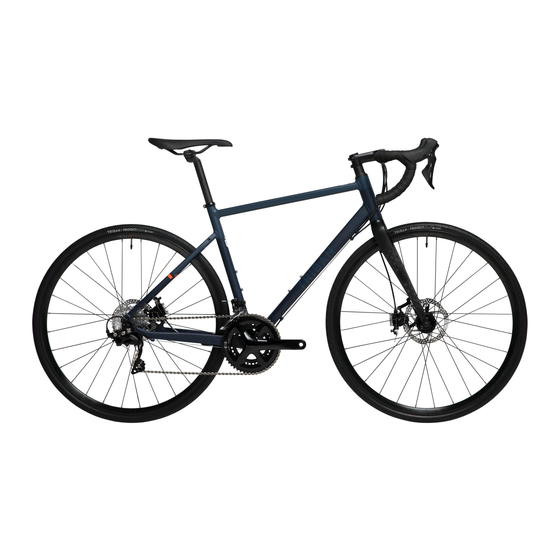Decathlon City 500 Instrukcja obsługi i instrukcje gwarancyjne - Strona 12
Przeglądaj online lub pobierz pdf Instrukcja obsługi i instrukcje gwarancyjne dla Rower Decathlon City 500. Decathlon City 500 17 stron.

CONVENTIONAL GEAR CHANGER
The gear changer stroke (front and rear) should not be too large so as not to
derail the chain. "Both gear changers should be adjusted as explained below:
REAR GEAR CHANGER:
Turn the screws stop as shown in the diagrams to align
the rear gear changer roller below the large spindle
L
(when the turning wheel is at the slow speed) and
below the small spindle (when the turning wheel is at
the greatest speed).
H
The screw marked H prevents the chain from going
beyond the large spindle and the screw L prevents it
from going beyond the small spindle.
L
H
FRONT GEAR CHANGER:
Turn the screws stop as shown in the diagrams having
previously position the chain as shown. The space bet-
ween the chain and the guide should be between 0
and 0.5 mm.
The screw marked L prevents the chain from derailing
in the frame, the screw marked H prevents derailing in
the right-hand pedal.
SPEEDS IN THE HUB
Setting speeds in the hub is very simple. The
method is explained in detail in the manufacturer's
instructions. This system enables you change speeds
when stopped, without noise and instantly and you
cannot derail. Single speed bicycles or those fitted
with hubs do not have gear changers and need no
specific maintenance. The chain tension should
however be verified (it slackens over time). Too
strong tension in the chain could damage the effec-
tiveness of the bicycle amateurs in its lifespan
(pedalling hard). Too week tension may lead to fre-
quent derailments.
22
CAUTION :
When you intend on changing speed, continue pedalling normally without
forcing, push the gear changer switch until the chain is in place on the chosen
crown or spindle, if your gear changers are not indexed.
Each clog on the switch corresponds to a position on the spindles. If the chain
tends not to go up or down quickly on the spindle, stretch the cable turning the
adjustment cylinder located on the switch all the gear changer, anticlockwise.
If the chain tends not to go up or down too quickly, turn at the cylinder clockwise.
The spindle must be changed fluidly
5/Bearing adjustment
The fork is responsible for holding the front wheel of your bicycle. The headset is
the bearing system, which allows the steering of your bike by the rotation of the
fork, the stem and the handlebar.
There are several areas on your bicycle containing bearings that must be adjusted
and/or lubricated. Proper maintenance in these areas will insure longer bearing
life, and easier and safer riding of your bicycle.
Proper adjustment of these bearings requires special tools and knowledge. We
suggest these adjustments be made by a qualified repairman. Please see instruc-
tions below for checking if bearings need to be adjusted. If so, follow these
instructions:
1. Put the key washer onto the fork stem so it is down as far as possible. The small
tab inside the key washer must fit into the slot on the fork stem.
2. Thread the lock nut onto the fork stem by hand.
3. If there is front to rear play in the headset tighten the adjusting cone, then secu-
rely tighten the lock nut
4. To check the headset for proper tightness, bounce the front wheel on the
ground and turn the wheel from side to side. If the fork binds, it means that it's
(too tight). If the fork shifts, it's (too loose). Loosen the lock nut, readjust the
adjusting cone, and then re-tighten the lock nut.
DANGER :
An over tightening of the stem-to-fork assembly bolts can make irreversible dama-
ges in the steering tube and may provoke an accident that can cause serious inju-
ries or death (can pull a blocking or a breakage of the movements, damage the
tube of direction...)
To avoid an over tightening, please respect the torques given in the "Assembly
and adjustments" chapter.
23
